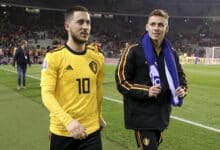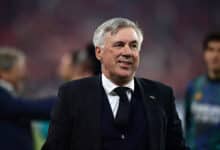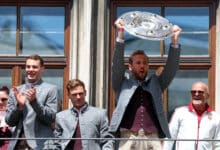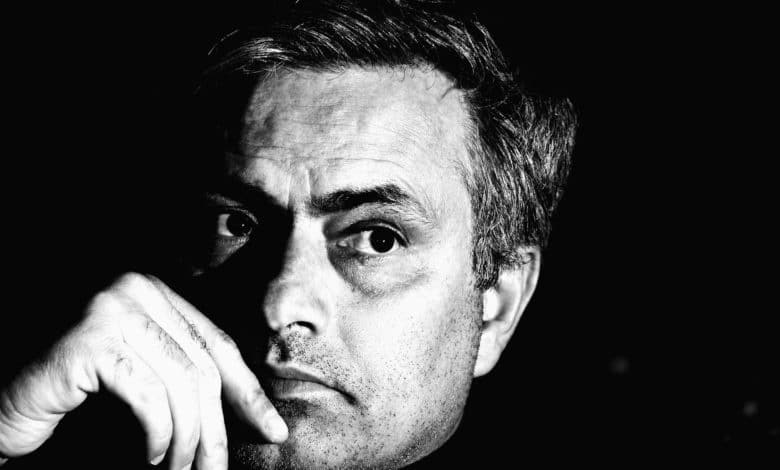
José Mourinho remains an elite-level football manager. Although he is not in his prime, he is still ingenious and among the finest masters of his craft. Lets look into the making of Mourinho…
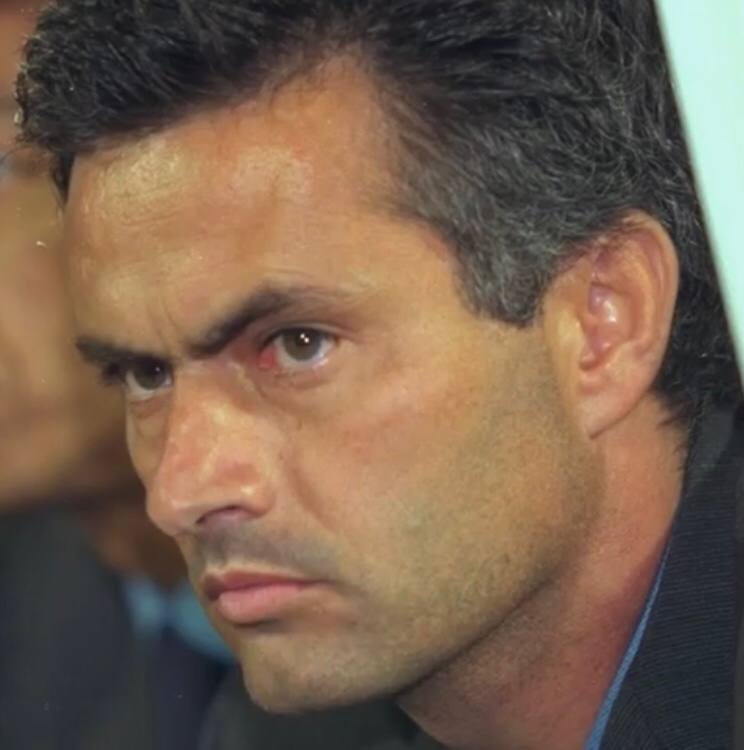
The coaching career of the great José Mourinho began in 1987 when he was aged 24. The Portuguese manager studied a coaching course with three years of sport science before he specialized for two years in football methodology. In the early 1990s José began working under Bobby Robson as a translator and assistant manager.
Robson was not a fluent Portuguese speaker and Mourinho filled an absolutely essential role in the English manager’s success during his time in Portugal. José is widely lauded for his valuable output behind the scenes as a coach, leading training sessions and developing tactical advances, and he followed Robson from Sporting Lisbon to Porto to FC Barcelona, working under the great Englishman in more than 80 games.
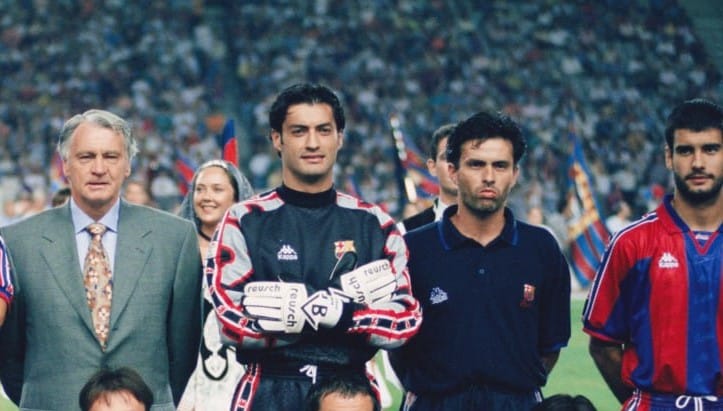
Robson succeeded the legendary Johan Cruyff as Barça manager but after a single season the Catalan club moved Robson into a football director role. Mourinho was retained as assistant manager and Dutchman Louis van Gaal was hired in 1997 following an impressive six-year spell at Ajax.
Mourinho could hardly have asked for two better mentors as an aspiring coach and come the age of 37 he took up his first managerial role, returning to his native Portugal to take the reigns at Benfica. He stayed in Lisbon for only a few months before he was shown the door and he then took up a job with small-time Leiria.
When José was courted by Porto in January 2002, the club had strong ambitions of winning the Portuguese league and felt that the protégé of Robson and van Gaal was the best candidate to deliver. Under Mourinho, Porto completed a mini-treble with the league, Portuguese cup and the UEFA Cup (now the Europa League) in what was his first season in charge.
José took Porto to even higher levels the following season. They retained league honours and were also remarkably crowned European champions as they hoisted the Champions League title. Mourinho’s men stunned Sir Alex Ferguson’s Manchester United in the Round of 16 and progressed all the way to the final in the German city of Gelsenkirchen, where they thrashed AS Monaco 3-0.
In more recent times Mourinho has elaborated on how the key for Porto was not spending large pots of money on big-name players across Europe, but rather by scouting and signing some of the best young prospects in Portugal. Deco and Ricardo Carvalho are two prime examples of the talented and hardworking players which José craved so deeply, and two said players played under Mourinho at multiple clubs.
Mourinho has also been quoted saying “sometimes the best investment you can do is to keep your best players”. This has been a recurring theme of his esteemed managerial career and almost always has he managed to sustain his squad, improve it and not lose out on their players to big European clubs.

After attaining a European winner’s medal, Mourinho was handpicked by Chelsea owner Roman Abramovich as the man to carry the torch under the Russian oligarch’s tenure as owner of the London club. When he was first unveiled at Stamford Bridge in July 2004, José introduced himself as the ‘Special One’ and backed up his confidence by winning back-to-back Premier League titles with the Blues.
Although he had an element of arrogance about him, José sought for his players to be merciless on the pitch and humble off of it. Despite the deep pockets of Abramovich, Mourinho did not always want or necessarily need the best and most popular players. Often he opted to pursue lesser-known players such as Didier Drogba and Michael Essien, who both went on to become greats at Stamford Bridge.
The only thing Mourinho said to Abramovich to convince him to buy Drogba?
— GOAL (@goal) January 17, 2019
“Pay. And don’t speak.” ? pic.twitter.com/ygs7gRCOAI
Mourinho moved on to a new project at Inter Milan, and set up from scratch to dominate Europe all over again. Six years after first capturing a first European quest with Porto in such spectacular fashion, Mou conquered Europe for a second time. As usual, he built a well-balanced team, recruited accordingly, and he engineered a world-class group at Inter and they ultimately reaped the rewards for his (and their) efforts.
During his two years in Italy, the Portuguese manager brought out the best in players such as Wesley Sneijder, Diego Milito, Maicon and Marco Materazzi in addition to countless others who contributed to Inter sitting atop the football world. Mourinho won five major trophies, including back-to-back Scudetto titles with the Nerazzurri before Real Madrid came calling.
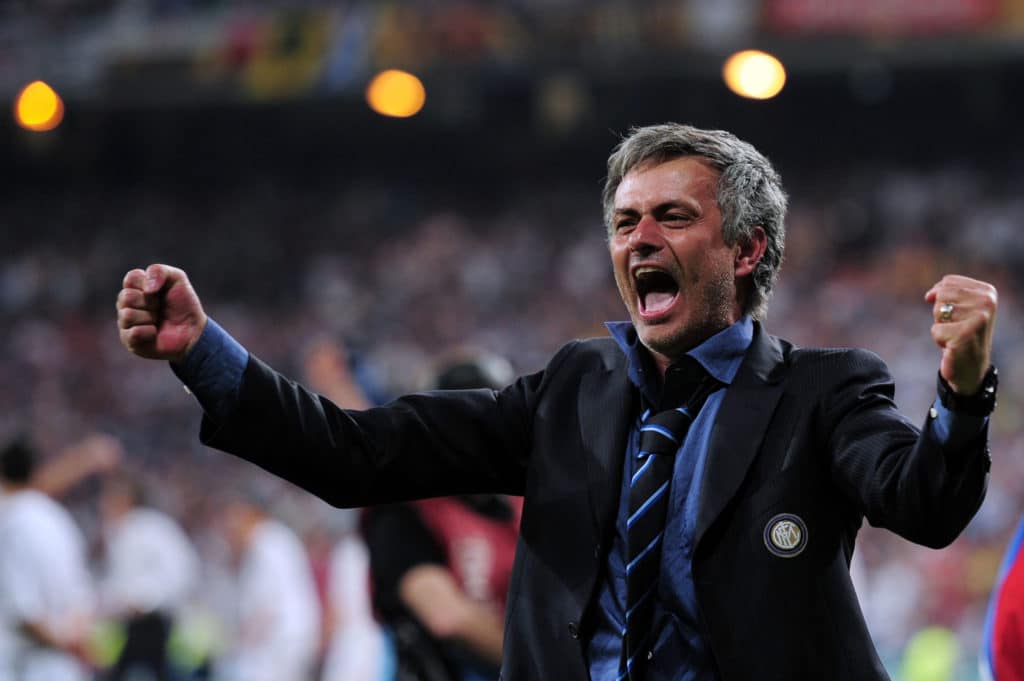
For the second time José was on the move as the reigning UCL-winning manager and he arrived in the Spanish capital with a grandiose reputation. Mourinho turned to Madrid in an attempt to thwart Pep Guardiola from running a one-man show in LaLiga, and to propel Real to its first European crown in a decade. Masterminding Guardiola in the Champions League semis with Inter was a huge factor behind his appointment by Florentino Perez.
There was no shortage of talent at Real, with players such as Cristiano Ronaldo, Kaka, Iker Casillas, Sergio Ramos, Karim Benzema at Mourinho’s disposal. He did not achieve success to as high a degree as before, winning the Copa del Rey in his first season and the league title in his second but he ultimately failed to restore Los Blancos to the top of European football.
Mou left Madrid and returned to Chelsea in 2013. He returned to London as a two-time Champions League winner as well as league champion in four different countries, and it showed in his character. Almost a decade after José first introduced himself as the special one, his second spell with the Blues saw him frequently involved in a plethora of clashes against an array of parties.
With age José has seemingly become a lot more ‘arrogant’ and has been on the receiving end of several fines, touchline bans and even a stadium ban due to his comments to the media, usually pertaining to referees and match officials. Moreover, he was wound up in a legal battle following a dispute with Chelsea physiotherapist Eva Carneiro, and he famously shoved Arsenal manager Arsene Wenger on the touchline in 2014. Mourinho also went on to label Wenger a “specialist in failure”.
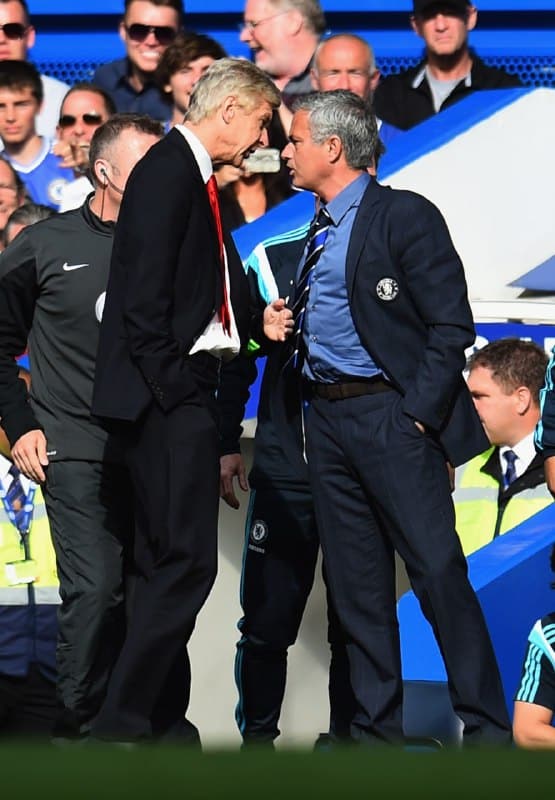
by 4th official Jon Moss
Mourinho added a third league title to Chelsea’s trophy cabinet before he was dismissed by Roman Abramovich and the Chelsea board, and he swapped London for Manchester – signing as Man United’s new manager in summer 2016.
José may have been the high-level manager United should have appointed when Ferguson stepped down in 2013, but the Portuguese sealed a return to London instead. The stature and prestige of Mourinho had gave United the ability to attract players of the highest level and his managerial prowess was a key factor behind bringing Zlatan Ibrahimović and Paul Pogba to Old Trafford. Ibrahimović and Mourinho previously worked together at Inter, where the Swedish striker scored 29 goals in 47 appearances.
Just like in all prior roles Mourinho did achieve success with the Red Devils, bagging the Europa League and the League Cup in his first season, however he has suggested that guiding his United team to 2nd in the Premier League remains one of his best accomplishments in management.
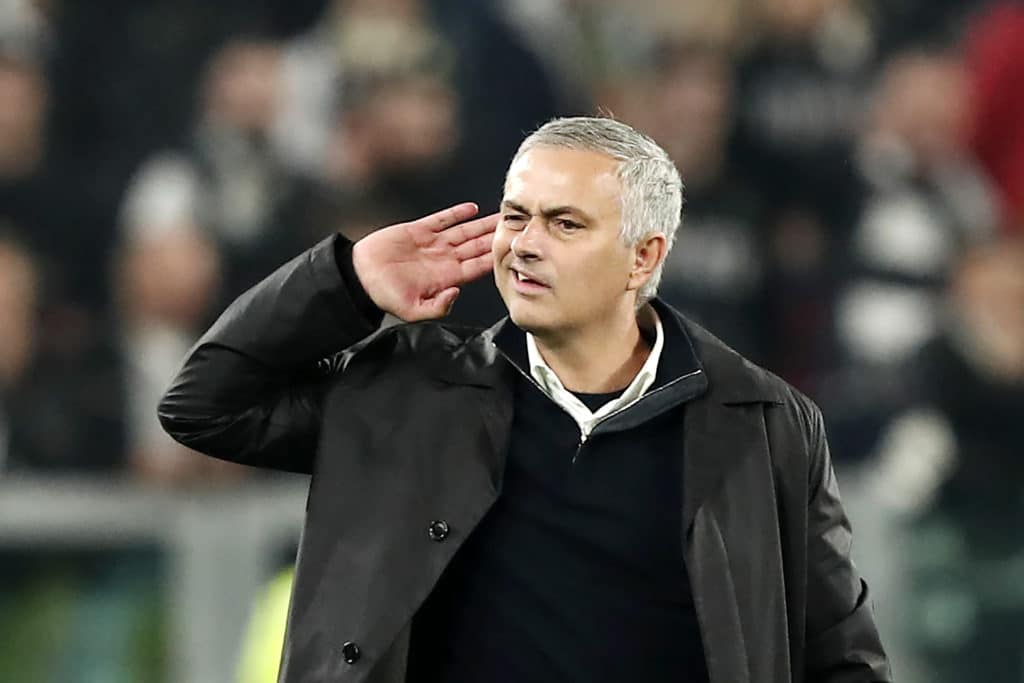
Since clearing his desk at Old Trafford, Mourinho has been proven right in most of his grievances from his time at the club – particularly concerning lazy players within a broken and toxic dressing room. Mourinho suggested for United to sell Anthony Martial in the summer 2018, but the club hierarchy sided with the player and by the turn of the year Mourinho was without a job.
United are yet to lift a trophy since his departure three-and-a-half years ago, something Mourinho reiterated in a recent interview with Sky. If Mou and United were locked in a race for who wins a trophy first, the 60-year-old would be on the verge of winning that race.
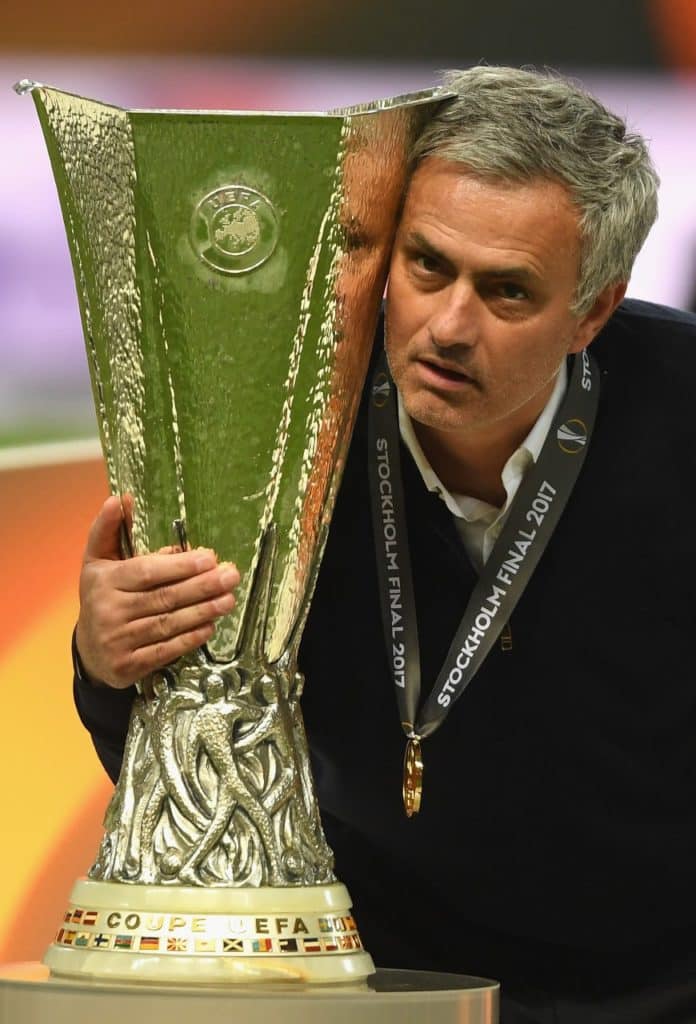
Mourinho was out of work for close to a year when Tottenham named him as their new manager in November 2019. Despite a short stay in North London, José installed a winning and fighting mentality into the Spurs players. He was booted within 18 months of his appointment.
Mourinho then made a long-awaited return to Italy after 11 years away as Roma secured his signature in July 2021, meaning he has worked in the capitals of England, Spain and Italy. Roma finished 6th in Serie A to qualify for next season’s Europa League, and the Giallorossi are 90 minutes away from ending the club’s 14-year trophy drought.
To date, Mourinho is the only manager to win the UEFA Cup/Europa League in successive seasons, and the first and only coach to win both major European cups (UCL and UEL) on multiple occasions. He triumphed in 16 of his 28 previous cup finals and has won a trophy with every team he has taken to a final (and managed them in it).
Mourinho has been at the epicentre of countless iconic moments, quotes, incidents and controversies. He is the gift that keeps on giving and even at the ripe age of 60 he remains one of the most animated and energetic managers in world football.
He is unquestionably one of the most successful managers of all-time and although he might not be admired by every football fan alike, the greatness of Mourinho will only be wholly appreciated once his managerial career is completely in the past.
Roma take on Dutch outfit Feyenoord and victory for Mourinho in Tirana would land his 25th major honour in management. It would also be the fifth time the Portuguese coach has won a major UEFA club knockout competition and he would thus become the joint-most successful manager in that regard.
As it turns out, José Mourinho truly is the Special One.
